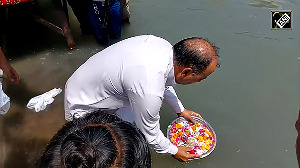The UN atomic watchdog sought more information from India about mishandling of radioactive material by Delhi University on Friday, as the country's nuclear regulator conducted inspections at the varsity campus.
The Atomic Energy Regulatory Board, country's apex radiation safety regulator, inspected the University's radioactive material storage room after it reported seepage of rainwater in it.
The Delhi University is in the eye of a storm after it came to light that Cobalt-60, which led to radiation exposure claiming one life in Mayapuri, originated from the varsity which auctioned a Gamma Irradiator to a scrap dealer.
International Atomic Energy Agency spokesman Marc Vridricaire said in Vienna that the watchdog had become aware "of the possibility of a serious radiation emergency at Mayapuri in New Delhi" via media reports on April 9.
As a result, the IAEA's Incident and Emergency Centre "has contacted India's Department of Atomic Energy to request information" and offer help, Vridricaire said.
The IAEA's Incident and Emergency Centre was "continuing to seek further information on this event," Vridicaire said.
"And the IAEA stands ready to assist Indian authorities upon request," the official added.
In New Delhi, Delhi University and the AERB rejected claims that 20 kg of uranium was "dumped" inside the campus a few years ago and ruled out fears about safety of radioactive materials in its laboratories.
Varsity Vice Chancellor Deepak Pental termed it as wrong that 20 kg of uranium was buried in the campus as claimed by a terminated professor. "This is wrong. If 20 kg of uranium was dumped somewhere in the campus, it would not have been possible for us to sit here," he said.
Pental alleged that Prof Ramesh Chandra, who made these allegations, "could have done this to settle personal score as he has been terminated from the service for financial irregularities."
AERB scientist Dr Raju Kumar said that there was no evidence about radioactive material being dumped inside the campus. He, however, said "there were certain radioactive materials which did not have proper labelling and they have been taken care of."
The experts of the AERB inspected the physics department premises after water was found inside a pit where radioactive materials were stored.
"There were minor discrepancies in the pit. But there is nothing to fear from the security point of view. We have fixed the problem," Raju Kumar of the AERB told the media after the four-hour-long examination.
"The officials inspected the source room where the radioactive materials are being kept. The pit where the sources are kept is filled with rain water for the past few days," a senior official said.
A four-member team of the AERB launched a probe into lapses by DU in auctioning of radioactive material. The team is also looking for radioactive pencils, which reportedly went missing.
Pental said a team of the AERB is currently investigating the laboratories and has not found any unsafe source of radioactive material.
The National Disaster Management Authority has suggested screening of people residing or visiting Mayapuri scrap yard, which was affected by radiation contamination, and continuation of the process of finding more sources of radioactivity in the area.
"Screening of the people around the area where radioactive Cobalt 60 was found is necessary to rule out the possibility of anyone else being exposed," a senior member of the NDMA said.
The NDMA also recommended scanning of all the shops in the scrapyard of Mayapuri to find out any remaining sources of cobalt 60, he said.
The scrap dealers, who were very closely exposed to the radiation source, suffered Acute Radiation Syndrome and one of them died and two more are very critical.
According to Atomic Energy Regulatory Board officials, the screening of scrap shops in Mayapuri is being carried out by India's Radiation Emergency Response system under the leadership of Dr Pradeep Kumar with the help of the Delhi police using portable detectors, including survey meters and also teledetectors.





 © 2025
© 2025